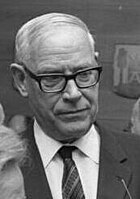The 1962 Hessian state election was held on 11 November 1962 to elect the 5th Landtag of Hesse. The outgoing government was a coalition of the Social Democratic Party (SPD) and All-German Party (GDP) led by Minister-President Georg-August Zinn.
| |||||||||||||||||||||||||||||||||||||||||||||||||||||||||||
All 96 seats in the Landtag of Hesse 49 seats needed for a majority | |||||||||||||||||||||||||||||||||||||||||||||||||||||||||||
|---|---|---|---|---|---|---|---|---|---|---|---|---|---|---|---|---|---|---|---|---|---|---|---|---|---|---|---|---|---|---|---|---|---|---|---|---|---|---|---|---|---|---|---|---|---|---|---|---|---|---|---|---|---|---|---|---|---|---|---|
| Turnout | 2,681,995 (77.7% | ||||||||||||||||||||||||||||||||||||||||||||||||||||||||||
| |||||||||||||||||||||||||||||||||||||||||||||||||||||||||||
 Results for the single-member constituencies. | |||||||||||||||||||||||||||||||||||||||||||||||||||||||||||
| |||||||||||||||||||||||||||||||||||||||||||||||||||||||||||
The result was a landslide for the SPD, which won an absolute majority of both votes and seats for the first time. The opposition Christian Democratic Union (CDU) slid to 29%, while the Free Democratic Party (FDP) recorded small gains. The SPD's coalition partner the GDP, formed by a merger of the GB/BHE and DP the previous year, retained six seats but failed to capture as many votes as the two partners had separately in 1958. Despite its majority, the SPD maintained its coalition with the GDP and continued in office.
Electoral system edit
The Landtag was elected via mixed-member proportional representation. 48 members were elected in single-member constituencies via first-past-the-post voting, and 48 then allocated using compensatory proportional representation. A single ballot was used for both. An electoral threshold of 5% of valid votes is applied to the Landtag; parties that fall below this threshold are ineligible to receive seats.
Background edit
In the previous election held on 23 November 1958, the SPD retained a clear first place with 44% of the vote despite a substantial swing to the CDU resulting from the collapse of the FDP vote, which fell to 10%. The SPD's coalition partner the GB/BHE remained steady on 7% and the government continued in office.
Parties edit
The table below lists parties represented in the 4th Landtag of Hesse.
| Name | Ideology | Lead candidate |
1958 result | |||
|---|---|---|---|---|---|---|
| Votes (%) | Seats | |||||
| SPD | Social Democratic Party of Germany Sozialdemokratische Partei Deutschlands |
Social democracy | Georg-August Zinn | 46.9% | 48 / 96
| |
| CDU | Christian Democratic Union of Germany Christlich Demokratische Union Deutschlands |
Christian democracy | Wilhelm Fay | 32.0% | 32 / 96
| |
| FDP | Free Democratic Party Freie Demokratische Partei |
Classical liberalism | Heinrich Kohl | 9.5% | 11 / 96
| |
| GDP | All-German Party Gesamtdeutsche Partei |
National conservatism | Gustav Hacker | 10.9% | 7 / 96
| |
Results edit
| Party | Votes | % | +/– | Seats | |||||
|---|---|---|---|---|---|---|---|---|---|
| Con. | List | Total | +– | ||||||
| Social Democratic Party | 1,340,625 | 50.28 | +3.94 | 44 | 7 | 51 | +3 | ||
| Christian Democratic Union | 760,435 | 28.52 | –3.17 | 4 | 24 | 28 | –4 | ||
| Free Democratic Party | 301,783 | 11.32 | +1.94 | 0 | 11 | 11 | +2 | ||
| All-German Party | 167,090 | 6.27 | –4.57 | 0 | 6 | 6 | –1 | ||
| German Peace Union | 94,956 | 3.56 | New | 0 | 0 | 0 | New | ||
| German Community | 1,433 | 0.05 | +0.01 | 0 | 0 | 0 | 0 | ||
| Total | 2,666,322 | 100.00 | – | 48 | 48 | 96 | 0 | ||
| Valid votes | 2,666,322 | 98.33 | |||||||
| Invalid/blank votes | 45,192 | 1.67 | |||||||
| Total votes | 2,711,514 | 100.00 | |||||||
| Registered voters/turnout | 3,451,314 | 78.56 | |||||||
External links edit
- "Final Results for the Landtag election of 11 November 1962" (PDF). Parliamentary Data Bank of the Hessian Landtag (in German). 22 November 1962. Retrieved 17 September 2023.
- "Elections to the Hessian state parliament, November 11, 1962". Hessian Regional History Information System (in German). Retrieved 17 September 2023.

